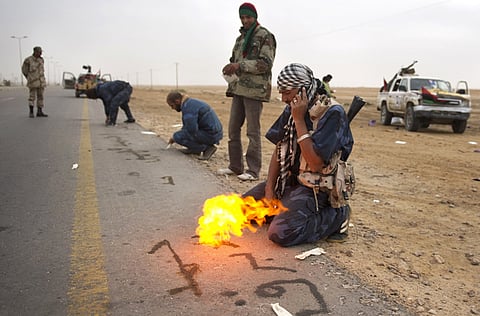Obama acknowledges 'stalemate' on ground in Libya
US President Barack Obama acknowledged Friday a "stalemate" on the ground in Libya

Tripoli: US President Barack Obama acknowledged on Friday there was a "stalemate" on the ground in Libya, but said he still expected the three-week-old air campaign to succeed in ousting Muammar Gaddafi eventually.
Obama and the leaders of France and Britain earlier jointly authored a newspaper article in which they pledged to continue the military campaign until Gaddafi leaves power, effectively making regime change the officially-stated aim of their air war.
"I didn't expect that in three weeks, suddenly as a consequence of an air campaign, that Gaddafi would necessarily be gone," Obama said in an interview with the Associated Press. "What we've been able to do is set up a no-fly zone, set up an arms embargo, keep Gaddafi's regime on its heels, make it difficult for them to resupply."
He said the mission had succeeded in stopping large-scale civilian casualties, especially in the rebel-held city of Benghazi, and would eventually succeed in ousting Gaddafi.
"You now have a stalemate on the ground militarily, but Gaddafi is still getting squeezed in all kinds of other ways. He is running out of money, he is running out of supplies. The noose is tightening and he is becoming more and more isolated.
"My expectation is that if we continue to apply that pressure and continue to protect civilians, which Nato is doing very capably, then I think over the long term Gaddafi will go and we will be successful."
More than a hundred government rockets crashed into Misrata on Friday, a second day of heavy bombardment of the city, the lone major bastion of the rebels in the western part of Libya.
A local doctor told Al Jazeera TV at least eight people had died and seven others were wounded. Rebels said 23 people were killed by missiles there on Thursday.
Hundreds of people are believed to have died in the city, under what Obama, French President Nicolas Sarkozy and British Prime Minister David Cameron described in their article as a "medieval siege".
"It is unthinkable that someone who has tried to massacre his own people can play a part in their future government," they wrote in the article, published on both sides of the Atlantic.
They acknowledged that their new goal of regime change went beyond the explicit terms of a U.N. Security Council resolution authorising force to protect civilians, but said Libyans could never be safe as long as Gaddafi remained in power.
Pressure
The United States led the bombing campaign in its first week, but has since then taken a back seat, putting Nato in command with the British and French responsible for most strikes on Gaddafi's forces. Obama made clear Washington was not planning to resume to a more active military role.
"What we're doing is still providing jamming capacity, intelligence, refuelling, so we still have a lot of planes up there. We're just not the ones who are providing strikes on the ground for the most part," he said.
Britain and France have been trying to persuade other Nato allies to contribute more fire power. Nato ministers met for a second day on Friday in Berlin, where the divisions were clear.
British Foreign Secretary William Hague and Nato Secretary-General Anders Fogh Rasmussen voiced optimism that allies would supply more combat planes, but Italy immediately ruled out ordering its aircraft to open fire.
French Defence Minister Gerard Longuet said London and Paris wanted to extend strikes to Gaddafi's logistic installations to try to break a stalemate in the two-month civil war.
Russia attended the Nato meeting and said the alliance was going beyond the terms of the U.N. Security Council resolution. Russia abstained but did not veto the resolution in March.
On the fluid eastern Libyan front, rebels said Gaddafi forces advancing from the oil port of Brega had opened fire on the western outskirts of the insurgent-held town of Ajdabiyah on Friday, killing one of their fighters.
The rebels have begged for more air strikes to avert what they say is a potential massacre in Misrata.
A rescue ship carrying nearly 1,200 Asian and African migrants, many needing urgent medical attention after weeks with little food or water in Misrata, was expected in Benghazi.
U.S. Secretary of State Hillary Clinton said the Nato allies were searching for ways to provide funds to the rebels, including helping them to sell oil from areas they control.
"The opposition needs a lot of assistance, on the organisational side, on the humanitarian side, and on the military side," she said.



